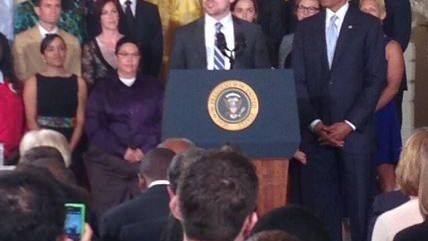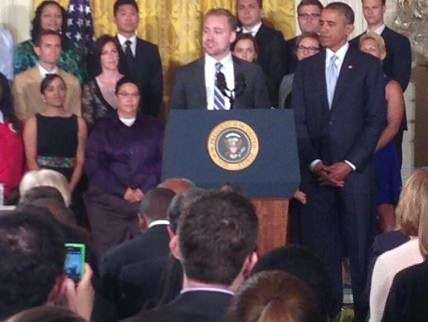White House Student Loan Propaganda Push in Full Swing


It's 2014, so that means after watching a hand-picked issue-specific "regular Joe" at the White House introduce the president because he's talking about the issue specific to him, you'll get an e-mail from that person via the White House. Today the issue is student loan debt and in this case the regular Joe is Andy MacCracken, the executive director of National Campus Leadership Council, a "venue for student body presidents and their teams to come together and confront exigent issues facing our generation."
The missive:
Hey, everyone --
I owe more than $75,000 in federal student loan debt -- and that's before you count interest.
So, as you might imagine, the action President Obama took today to make debt more manageable for millions of Americans is very personal to me.
When I was growing up in Colorado, my parents worked multiple jobs and made plans to refinance our house just so they could afford to put me through college.
But when my mom was diagnosed with breast cancer during my freshman year of high school, it meant the money they'd planned to use for my education went toward saving her life. Student loans made it possible for me to go to college and complete my education, but now they present a serious financial burden.
With tens of thousands of dollars in student debt, the only reason I'm not losing my mind is because I know my repayment will be manageable. Pay As You Earn, for example, means my monthly payments will be about $200 per month instead of nearly $900 per month.
Today, President Obama directed the Secretary of Education to propose regulations that would give nearly 5 million federal direct student loan borrowers like me the opportunity to cap their payments at 10 percent of their income. That's on top of steps he's already taken to keep interest rates low and expand income-based repayment programs.
That could not be more real for me -- and for millions of Americans across the country who have stories like mine. Maybe you're one of them.
So right now, there are two things you can do:
- Learn more about the action the President took today, and then pass it on to someone you think needs to see it.
- If you have a question about today's action, or just about education in general, then ask it here. The President will be answering them during a live Q&A on Tumblr tomorrow at 4 p.m. Eastern.
Right now, I'm surrounded by new graduates who want to improve the world around us -- as teachers, public servants, and, like me, as non-profit leaders.
The action this president is taking is helping to make sure finances aren't holding us back from achieving our potential.
And that's truly invaluable for me, my generation, and the nation as a whole.
Andy MacCracken
Arlington, Virginia
Andy doesn't mention what degree he went to school for. These kinds of stories usually don't because volunteering such information would lead to the question: "and you expected that degree to raise your income-earning potential enough to pay off the loans needed to get it?" Andy deploys the canard about "achieving our potential" unburdened by past debts, yet managing your debt and finances is an integral part of adulthood, something Andy's generation claims to be. That more federal subsidies of higher education will further drive up the price of higher education should be obvious to anyone who's taken a basic economics class, as it should be obvious that the number of "public servants" and "non-profit leaders" higher education produces is indicative of a mismatch between supply and demand. That it isn't raises serious questions about the quality of higher education in America today.


Show Comments (199)